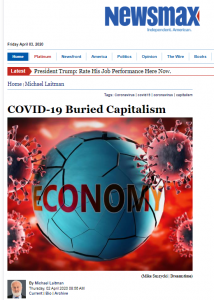 On March 20, historian Yuval Noah Harari wrote in the Financial Times that the nature of emergencies is to fast-forward historical processes. True, everything that we have known, our entire civilization, is rapidly falling apart. Most people still hope that once the virus is gone their lives will pick up where they left off. They will not. Coronavirus will have changed everything.
On March 20, historian Yuval Noah Harari wrote in the Financial Times that the nature of emergencies is to fast-forward historical processes. True, everything that we have known, our entire civilization, is rapidly falling apart. Most people still hope that once the virus is gone their lives will pick up where they left off. They will not. Coronavirus will have changed everything.
It is not merely a transformation of attitude, but a change of our entire paradigm of life. Former British Prime Minister Gordon Brown touched on it when he wrote that to fight the coronavirus, “instead of dog-eat-dog bidding wars that encourage profiteering, the G20 should back the World Health Organization and the Global Fund’s efforts to coordinate and increase production and procurement of medical supplies.”
Shedding the dog-eat-dog paradigm is imperative, but the virus isn’t likely to disappear in the near future. There are already no less than 40 known strains of the virus. Second, even if we do manage to miraculously abolish all aggressive variants, by the time we can resume normalcy, we will discover that we ourselves have changed dramatically, and the frantic consumerism will no longer seem appealing.
It has stopped tourism, transportation, sports, entertainment, COVID-19 isn’t only changing our economy or even our way of life; it is changing our very thinking about life.culture, industry, education, socializing and even our ability to congregate for prayer. When we restart civilization, we will be different. Or, rather, we had better be different if we don’t want a sequel for the Novel Coronavirus episode.
A Novel Economy
When a superbug imposes a quarantine on the entire world, its ramifications are unfathomable. Sooner rather than later, countries will have to see to their citizens most basic needs. Food, housing, healthcare and education will all have to be administered by governments since the majority of people will simply not have any income to purchase any of the above, not to mention luxuries or gadgets.
The quarantine, or “stay at home” policy, is not just an emergency measure; it is the end of capitalism. We may not realize it but along with the coffins of our loved ones, we buried the way of life and way of thinking about life we all grew up on. Capitalism is dead.
The new economy that will emerge from the ashes will have to be based on different values. Since jobs will be virtually obsolete, wealth and power will become irrelevant gauges of success. But since human nature always strives for prominence, new standards will take over where the old ones left a void.
Instead of power by control, leadership by example will take the fore. Those who contribute the most to lifting the spirit of society, guaranteeing people’s well-being, and increasing social solidarity will become the prominent people in society.
Until now, we competed like children playing King of the Hill. Gradually, the virus will teach us to value and pay tribute to those who exert to push everyone uphill, to lift society rather than themselves.
The new economy that will emerge from the ruins of the old one will not be a new form of socialism. It will be an economy of mutual responsibility. Mutual responsibility is not an economic paradigm, but a social one, entailing both economic and educational aspects. It does not require material equality, but mutual concern that guarantees that people a) have what they need, and b) want everyone else to have what they need.
In an economy based on mutual responsibility, personal attributes are cherished and nurtured as long as one uses one’s skills to improve everyone’s lives. This approach allows for endless ways for people to express themselves, and society will reward them for doing so. Respect, admiration, and love for the people who contribute will more than compensate for the pursuit of wealth and possessions.
For this reason, introduction of mutual responsibility should occur on the physical level as well as on the intellectual level. On the former, as said above, governments will have to tend to people’s basic needs. On the latter level, we must establish an online education system where scientists and other pundits introduce the notion of mutual responsibility and explain why today’s reality requires it.
The idea behind these educational programs is not merely to help humanity overcome the virus. The goal is to change the paradigm that governs our lives from focusing on the “me” to focusing on the “we,” thereby creating a flourishing and sustainable society. The dog-eat-dog paradigm that Brown talked about is why the coronavirus has arrested our civilization. If we want to win, we should now build one that relies on mutual responsibility, and any moment’s delay is one moment too late.
Featured in Newsmax